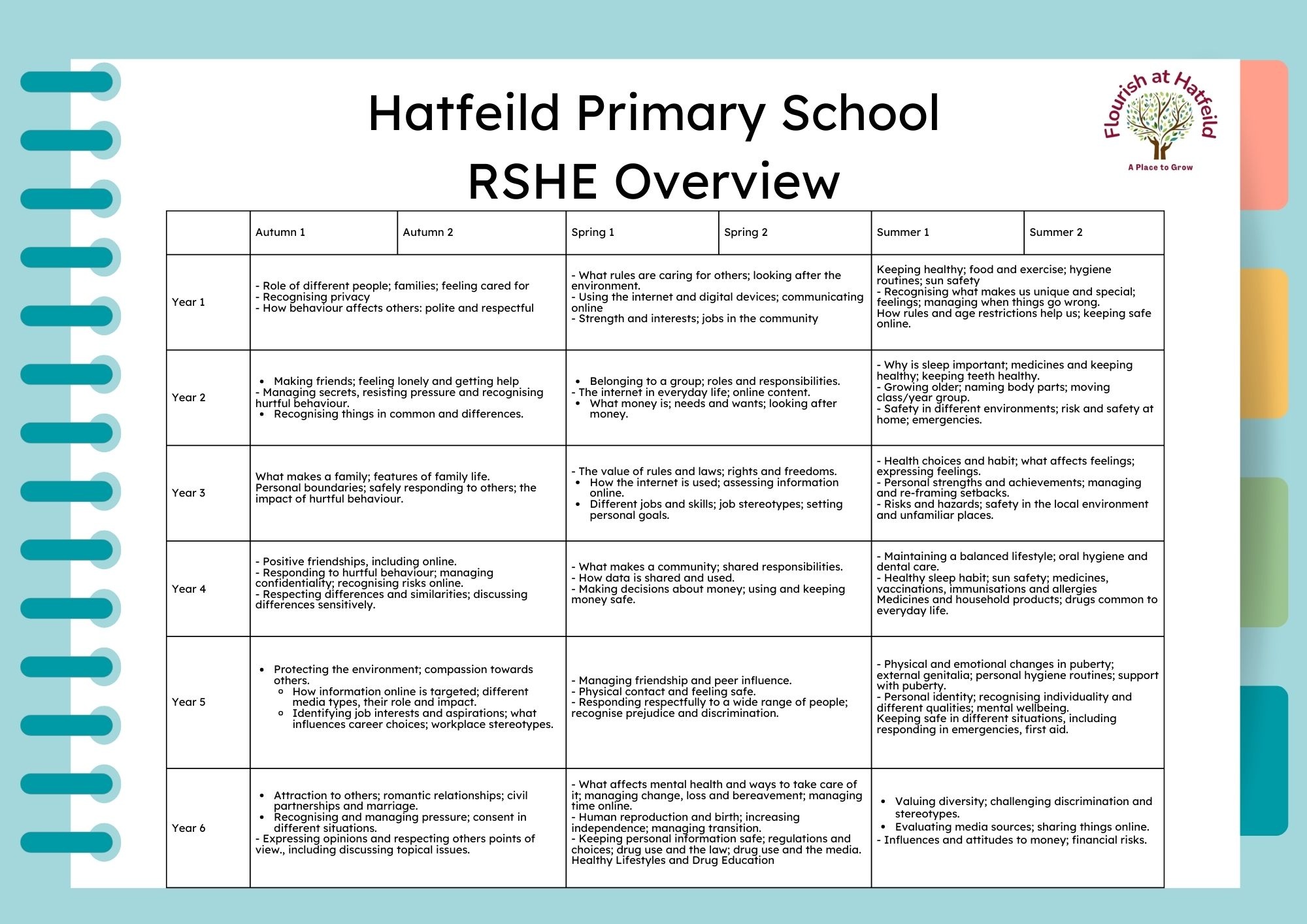PSHE including Sex and Relationships
Intent
At Hatfeild Primary School, we understand the vital role that the PSHE curriculum plays in the development of the knowledge, skills and attributes that our pupils need to manage their lives, now and in the future. These skills and attributes help pupils to stay healthy, safe and prepare them for life and work in modern Britain. When taught well, PSHE education helps pupils to achieve their academic potential, and leave school equipped with skills they will need throughout later life. As children progress throughout school, they will explore their attitudes, values and beliefs and develop their skills further. By the end of KS2, children’s resilience, self awareness, behaviour choices, mental wellbeing and social skills will enable them to move on to their next stage of learning.
PSHE (PSED) in the Foundation Stage is explored through all areas of the Foundation Curriculum. It is one of the prime areas and is broken into three sub areas: self-regulation, managing self and building relationships. As they progress through Nursery and Reception, children learn how to foster social skills such as sharing, turn taking, empathy for others, the ability to make and sustain relationships, confidence and independence, awareness of feelings and cooperation. They also learn about healthy lifestyles and how to overcome challenges.
Hatfeild Primary School’s definition of PSHE (in line with the Department for Education) is that it encompasses all areas designed to promote children’s personal, social and health development. It gives children the knowledge, skills and understanding that they need to stay healthy and safe, develop worthwhile relationships, respect differences, develop independence and responsibility, and make the most of their own abilities and those of others. It helps them to understand British values in order to live as a responsible citizen.
Implementation
At Hatfeild, we draw upon the PSHE Association to help write our PSHE Curriculum. We also respond to local and national events (as well as the needs of our children) as and when needed, to ensure children’s concerns and uncertainties are followed up in a safe, understanding and nurturing environment. In response to these issues, we do at times teach additional lessons above and beyond those planned through the PSHE Association.
Impact
Our vision is for our children to leave Hatfeild as happy individuals who are informed but curious learners that show respect and tolerance to the diverse society living in Modern Britain today, having a broad and thorough knowledge of different religions, cultures and British Values. To have a strong self-awareness, interlinked with compassion for others and to have an appreciation of what it means to be a positive member of a diverse, multicultural society. They will have the ability and knowledge of how to keep themselves safe, (physically, virtually, mentally and socially) and make informed decisions about their lifestyles, mental and physical health, develop good relationships and aspirations.
Our recent Ofsted report commented ‘Staff in the early years encourage children to focus on their work and to be independent. Children in Nursery and Reception interact with each other respectfully.’
‘Pupils are helped to understand how families can be different in modern Britain. They are especially proud of how inclusive their school is. Pupils are welcoming and friendly. They celebrate each other’s differences. Pupils are taught about how to keep healthy both physically and mentally.’
In order to ensure our aims and intent have been met, we scrutinise what children have learnt through:
-
Assessing children’s knowledge of key components of learning as set out within schemes of work.
-
Asking children at the beginning of a topic what they know already, then at the end compare this to what they have learnt during the topic.
-
Assessing children’s understanding of topic-linked vocabulary.
-
Interviewing the pupils about their learning (pupil voice conversations).
-
Moderation and scrutiny of pupil’s books and professional dialogue between teachers to assess the quality of children’s learning.
-
Sharing good practice in staff meetings.

